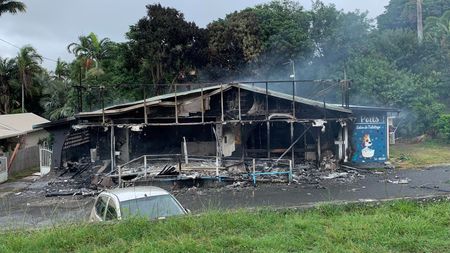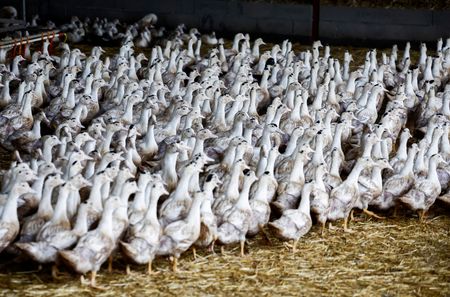By Kirsty Needham and Camille Raynaud
SYDNEY/PARIS (Reuters) – New Caledonia’s Pacific neighbours called for de-escalation and a return to dialogue between France and the island territory’s political parties, after a third night of violent riots that have killed four people and led to hundreds of arrests.
France declared a state of emergency in New Caledonia that came into force at 5 a.m. local time (1800 GMT Wednesday), giving authorities additional powers to ban gatherings and forbid people from moving around the island.
Rioting broke out over a new bill, adopted by lawmakers in Paris on Tuesday, that will let French residents who have lived in New Caledonia for 10 years vote in provincial elections – a move some local leaders fear will dilute the indigenous Kanak vote.
The protests were organised by Field Action Co-ordination Cell (CCAT), which was condemned on Thursday by France’s High Commissioner Louis Le Franc, who differentiated the organisation from the major pro-independence political party, FLNKS, which has called for calm.
Armed forces were protecting New Caledonia’s two airports and port, he said, adding that at least four alleged instigators were under house arrest.
A representative of CCAT said they did not know who was under house arrest.
“There will not be the army in the streets of New Caledonia. It is a question of maintaining order,” French Interior Minister Gérald Darmanin said on Thursday, adding that numbers of police and gendarmes in New Caledonia would rise from 1,700 to 2,700 by Friday evening, with a small number of soldiers assisting.
Three young Kanak have died in the riots, and a 22-year-old police official died of a gunshot wound. Police had arrested the person responsible for shooting two of the Kanak who died, he said.
In an interview on France 2, Darmanin appeared to suggest foreign interference, saying “some independence leaders had made a deal with Azerbaijan”, but gave no evidence.
Several leaders of Pacific Island states, which are threatened by rising sea levels, this week visited Azerbaijan as it prepares to host the United Nations climate conference COP29 later in the year.
Electoral reform is the latest flashpoint in a decades-long tussle over France’s role in the mineral-rich island, which lies in the southwest Pacific, some 1,500 km (930 miles) east of Australia.
New Zealand Foreign Minister Winston Peters called for all sides to de-escalate a situation that was “of serious concern across the Pacific Islands region”.
Vanuatu’s prime minister, Charlot Salwai, chairman of the Melanesian Spearhead Group, which also includes Fiji, Papua New Guinea and Solomon Islands, said the indiscriminate destruction of property would affect New Caledonia’s economy in a big way and have a cascading effect on the lives of all New Caledonians, including Kanaks.
France should establish dialogue with FLNKS, which has condemned the violence, and annul the constitutional reform that sparked the crisis, he said.
“These events could have been avoided if the French government had listened,” he added.
Australian Foreign Minister Penny Wong in parliament called for calm and said Australia supported discussions between all parties.
More than 200 people have been arrested, and 64 gendarmes and police injured, while road barricades put up by the protesters were causing a “dire situation” for medicine and food for the population, Le Franc said in a televised news conference.
Main and secondary roads in Noumea were blocked by barricades with burning cars and car carcasses, some with booby traps, he said.
“I am calling on those at the head of the CCAT to stop these actions, which are murderous, deadly actions that can leave families in mourning,” he said of the traps.
There were also confrontations overnight between CCAT members and self-defence groups who are also in breach of the curfew and a weapons ban, he said.
Noumea resident Yoan Fleurot told Reuters in a video interview that he has seen looting and destruction of property. Some storeowners willingly let their shelves be raided, pleading that their shops not be destroyed, he said.
Fleurot said he is armed with a firearm and has video surveillance installed around his house, adding he has only ventured out in daylight to check on his parents or his properties.
“Caledonia will have a hard time recovering from this crisis… Everything, 80%, is destroyed,” he added.
(Reporting by Kirsty Needham in Sydney, Camille Raynaud, Augustin Turpin, Juliette Jabkhiro, Louise Dalmasso, Michaela Cabrera in Paris, Lucy Craymer in Wellington. Editing by Gerry Doyle)










